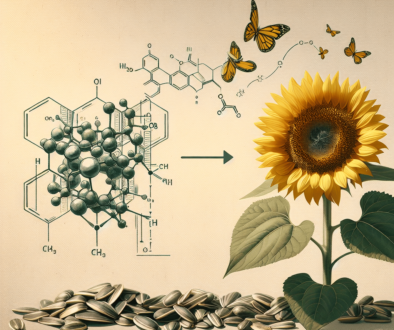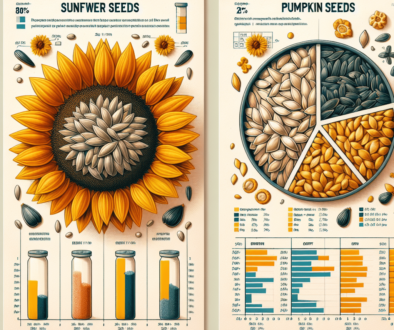Inflammation and Sunflower Protein: What You Should Know
-
Table of Contents
- Inflammation and Sunflower Protein: Essential Insights for Health Enthusiasts
- Understanding Inflammation: The Body’s Response System
- The Rise of Plant-Based Proteins in Anti-Inflammatory Diets
- Sunflower Protein: A Nutritional Powerhouse
- Scientific Evidence: Sunflower Protein and Inflammation
- Incorporating Sunflower Protein into Your Diet
- Comparing Sunflower Protein to Other Plant-Based Proteins
- Potential Drawbacks and Considerations
- Conclusion: Embracing Sunflower Protein for Inflammation Management
- Discover ETprotein’s Premium Sunflower Protein Products
Inflammation and Sunflower Protein: Essential Insights for Health Enthusiasts

In the quest for optimal health, understanding the role of dietary choices in managing inflammation is crucial. Among the myriad of plant-based proteins available, sunflower protein emerges as a noteworthy contender. This article delves into the relationship between inflammation and sunflower protein, offering a comprehensive guide for those looking to make informed dietary decisions.
Understanding Inflammation: The Body’s Response System
Inflammation is the body’s innate response to injury, infection, or irritation. It is a complex biological process involving immune cells, blood vessels, and molecular mediators. While acute inflammation is a protective and localized response to harmful stimuli, chronic inflammation can lead to various health issues, including heart disease, diabetes, and autoimmune disorders.
- The role of acute inflammation in healing and protection
- Chronic inflammation and its link to lifestyle diseases
- Identifying signs of chronic inflammation
The Rise of Plant-Based Proteins in Anti-Inflammatory Diets
Plant-based diets have gained popularity for their potential to reduce inflammation. Proteins derived from plants are not only sustainable but also come with a host of health benefits. They are rich in essential nutrients and often contain bioactive compounds that can modulate the body’s inflammatory response.
- Comparing animal and plant proteins in inflammation
- Nutritional advantages of plant-based proteins
- How bioactive compounds in plants can influence inflammation
Sunflower Protein: A Nutritional Powerhouse
Sunflower seeds are a rich source of high-quality protein, vitamins, minerals, and antioxidants. Sunflower protein, extracted from these seeds, is gaining attention as a valuable addition to an anti-inflammatory diet. It is not only nutrient-dense but also possesses properties that may directly impact inflammation.
- Nutritional profile of sunflower seeds and protein
- The extraction process of sunflower protein
- Benefits of sunflower protein in an anti-inflammatory diet
Scientific Evidence: Sunflower Protein and Inflammation
Emerging research suggests that sunflower protein may have anti-inflammatory effects. Studies have examined the influence of sunflower protein on various markers of inflammation, providing insights into its potential health benefits.
- Overview of studies on sunflower protein and inflammation
- Analysis of sunflower protein’s impact on inflammatory markers
- Case studies highlighting the anti-inflammatory effects of sunflower protein
Incorporating Sunflower Protein into Your Diet
Integrating sunflower protein into your daily routine can be simple and delicious. It can be used in a variety of recipes, from smoothies to baked goods, offering a versatile and nutritious option for those seeking to reduce inflammation through diet.
- Tips for adding sunflower protein to meals and snacks
- Recipe ideas featuring sunflower protein
- Considerations for portion sizes and frequency of consumption
Comparing Sunflower Protein to Other Plant-Based Proteins
While sunflower protein is an excellent choice, it’s important to compare it with other plant-based proteins. Each protein source has a unique nutrient profile and potential health benefits, making it essential to understand the differences and how they fit into an anti-inflammatory diet.
- Nutritional comparison of sunflower protein with other plant proteins
- Pros and cons of various plant-based proteins in managing inflammation
- How to choose the right plant protein for your dietary needs
Potential Drawbacks and Considerations
Despite the benefits, there are considerations to keep in mind when consuming sunflower protein. Allergies, processing methods, and the source of the protein can all impact its suitability for an individual’s diet.
- Understanding sunflower seed allergies and sensitivities
- The importance of processing methods in preserving nutrients
- Choosing high-quality sunflower protein products
Conclusion: Embracing Sunflower Protein for Inflammation Management
In conclusion, sunflower protein stands out as a valuable addition to an anti-inflammatory diet. Its rich nutritional profile, coupled with potential anti-inflammatory properties, makes it an attractive option for health-conscious individuals. By incorporating sunflower protein into a balanced diet, one can take a proactive step towards managing inflammation and promoting overall well-being.
Discover ETprotein’s Premium Sunflower Protein Products
If you’re looking to incorporate high-quality sunflower protein into your diet, ETprotein offers a range of products that cater to your needs. Their sunflower seed protein is characterized by a neutral taste, non-GMO, and allergen-free attributes, making it an excellent choice for various applications.
ETprotein’s commitment to quality and customer satisfaction ensures that you receive the best plant-based proteins to support your health goals. Whether you’re involved in the nutraceutical, pharmaceutical, or food and beverage industry, ETprotein can provide the protein solutions you require.
Contact ETprotein today to explore their sunflower protein options and take the next step in your journey towards a healthier, inflammation-managed lifestyle.
About ETprotein:
ETprotein, a reputable protein Chinese factory manufacturer and supplier, is renowned for producing, stocking, exporting, and delivering the highest quality organic bulk vegan protein and plant proteins. They include Organic rice protein, clear rice protein, pea protein, clear pea protein, pumpkin seed protein, sunflower seed protein, mung bean protein, etc. Their offerings, characterized by a neutral taste, non-GMO, allergen-free attributes, cater to a diverse range of industries. They serve nutraceutical, pharmaceutical, cosmeceutical, veterinary, as well as food and beverage finished product distributors, traders, and manufacturers across Europe, USA, Canada, Australia, Thailand, Japan, Korea, Brazil, and Chile, among others.
ETprotein specialization includes exporting and delivering tailor-made protein powder and finished nutritional supplements. Their extensive product range covers sectors like Food and Beverage, Sports Nutrition, Weight Management, Dietary Supplements, Health and Wellness Products, and Infant Formula, ensuring comprehensive solutions to meet all your protein needs.
As a trusted company by leading global food and beverage brands and Fortune 500 companies, ETprotein reinforces China’s reputation in the global arena. For more information or to sample their products, please contact them and email sales(at)ETprotein.com today.












